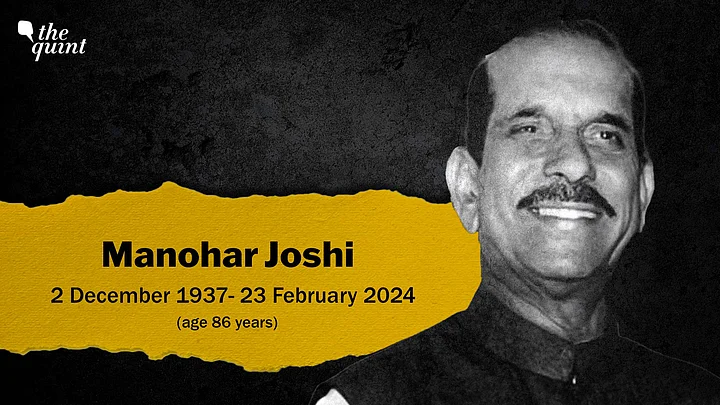He was "Joshi Sir" to his students and followers alike as well as to the entire political class as well as the state of Maharashtra.
Manohar Joshi was a name to reckon with. He was the first non-Congress Chief Minister of Maharashtra, who also made a mark as a Union Minister and Lok Sabha Speaker.
Despite being from the hardline Shiv Sena, Sonia Gandhi saw nothing wrong in him being a presiding officer of Parliament, which speaks volumes of his amiable personality and his skills to take everyone along.
An Exemplary Story of Grit and Growth
The journey of Manohar Joshi as a boy from a village in the Raigad district of Konkan was a long and arduous one. The story of Joshi was much different from many in the Shiv Sena or contemporary politicians.
Born in a poor family in Raigarh district, he survived on madukari, food given as alms to those who had undergone the thread ceremony. He served food in inns, worked as a peon in Mumbai, and then became a clerk in the Brihanmumbai Municipal Corporation (BMC) in his days of struggle. But that did not affect his education in Mumbai. He completed higher education and took to entrepreneurship immediately.
He was introduced to Bal Thackeray at a meeting in Pune by Thackeray's younger brother Srikant sometime after the formation of the Shiv Sena. And soon Manohar Joshi became a part of his inner circle.
His graph of growth in the party was phenomenal. He got elected to the BMC, became Mayor, and was elected to the Maharashtra legislative council, and then Assembly. He became the Leader of the Opposition and in 1995 became the CM. He was elected to the Lok Sabha, and the Rajya Sabha, became Union minister in the Atal Behari Vajpayee government, and later the Lok Sabha Speaker.
A Shiv Sena Loyalist for Life
His people's personality got him the Chief Ministership as the Shiv Sena-BJP government headed by him was dependent on several independents, who had to be well looked after.
A trusted associate of the Shiv Sena founder, Bal Thackery chose him for the top job despite demands from the rank and file that the job be given to Sudhir Joshi, another veteran, popular among them.
Heading the Shiv Sena-BJP government in the premier state from 1995 to 1999 was the high point in the political career of the loyal Shiv Sainik chosen by Thackeray, who always remained his boss. There was no question of who and why.
When Thackeray sent him a letter demanding his resignation as the CM, Joshi promptly did so without any murmur or asking as to why.
This extreme loyalty brought in many rewards ranging from Municipal Councillor to Mayor of Mumbai and from the Leader of the Opposition in the Maharashtra Assembly to the first non-Congress CM.
Joshi’s Political Ascent Inside and Outside Party
Joshi was an object of envy in the Sena for the responsibilities he got and was the reason for leaders like Chagan Bhujbal, who was the OBC face of the Sena, to quit.
The start of the Jhunka Bhakar programme on a massive scale to make cheap meals available for the poor in Maharashtra was one of the salient programs of his government.
Joshi had the distinction of being a member of four law-making bodies –both Houses of Maharashtra legislature and a member of Lok Sabha and Rajya Sabha. When the then Lok Sabha Speaker GMC Balayogi had an accidental death, Joshi, who was the Union Minister for Heavy Industries in the Vajpayee government, saw it as an opportunity and gently conveyed Pramod Mahajan, one of the key decision-makers in government, about his desire to replace the speaker.
Reports had it that Joshi told Mahajan that he be made the Presiding Officer as he cannot fulfill the ever-growing demands of the Sena leadership.
Joshi carried out the task with aplomb.
But, the defeat in the 2004 Lok Sabha polls from a relatively unknown Eknath Gaikwad of the Congress was almost the end of his political career though he was later made a member of the Rajya Sabha.
A Pathbreaker in Many Ways
The much-talked-about Bombay Pune Expressway was also built when Joshi was the CM. He went along with the proposal of his concerned minister Nitin Gadkari to build it at a price much lower than quoted by Dhirubhai Ambani's Reliance.
Joshi backed Gadkari to the hilt despite the fact he belonged to the BJP. Gadkari, who is now known as one of the most competent Union Ministers, has always been full of praise for Joshi for the initial encouragement.
Joshi was the founder of the Kohinoor Technical Institute, who always advocated that the Marathi youth should take to entrepreneurship instead of running after jobs.
The ever-smiling, mild-mannered Joshi in the hardline Shiv Sena, was a different leader. He was never known as an aggressive Hindutvadi either in the Shiv Sena or the saffron Combine.
Even though Brahmins are insignificant politically in Maharashtra dominated by Marathas, Joshi became the first Brahmin CM to lead the first non-Congress coalition government for four years.
Chhagan Bhujbal, the OBC face of the Shiv Sena wanted to become the Leader of the Opposition in the post-Mandal era but Bal Thackeray made Manohar Joshi the LoP instead.
Known as ajatshatru, Joshi had virtually no enemy in politics including in his own party Shiv Sena. But Chhagan Bhujbal and Narayan Rane hardly had cordial relations with Joshi who got marginalised in the party after the emergence of Uddhav Thackeray as Bal Thackeray's successor.
(Sunil Gatade is a former Associate Editor of the Press Trust of India. This is an opinion piece and the views expressed are the author's own. The Quint neither endorses nor is responsible for them.)
